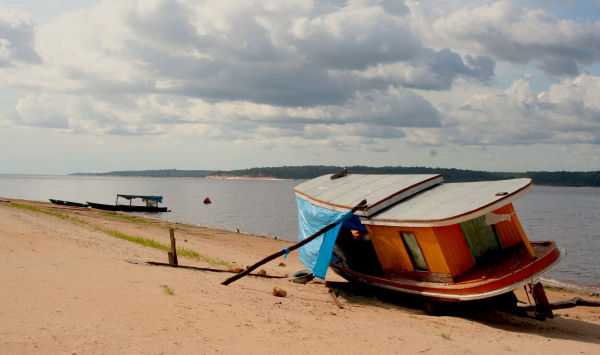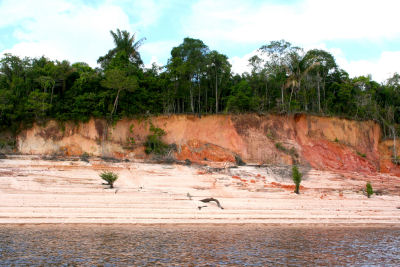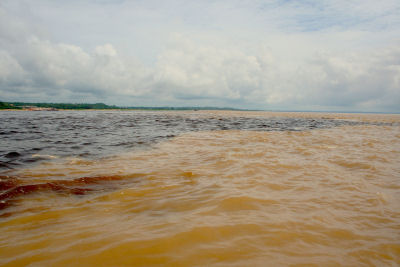
Amazon, Climate Change and Geochemistry
Amazon, Climate Change and Geochemistry: joint European-Brazilian scientific co-operation in the CLIM-AMAZON project
The Amazon Basin with its 7.6 Mio km² is almost the size of Europe, and its biggest river, the Rio Amazon, supplies more than 15% of the total freshwater input to the world’s oceans. Deforestation, agriculture, mining and urbanization have put the region under considerable anthropogenic stress, affecting, amongst others, regional climate, CO2 balance, biodiversity, river discharge and sediment load. While this is widely recognized, access to the region can be rather difficult.

CLIM-AMAZON is an EU-funded project to enhance cooperation and transfer of scientific knowledge between EU-countries (and FP7 associate countries) and Brazil. In addition to Fundação Universidade de Brasília (UnB, Brazil) and Institut de recherche pour le développement (IRD, France), the consortium is comprised of research groups in Germany (Jacobs University Bremen and Helmholtz-Zentrum Potsdam – Deutsches GeoForschungsZentrum), the United Kingdom (Imperial College of Science, London), and the Netherlands (Royal NIOZ Texel and University of Amsterdam). The CLIM-AMAZON consortium, including members of the European Association of Geochemistry (EAG), currently hosts three PhD students and two PostDocs, but funding for one additional project is available and one more PostDoc position can be filled within the near future (for details see the CLIM-AMAZON website at http://www.clim-amazon.eu).
The main goal of the CLIM-AMAZON project is to facilitate cooperation and transfer of knowledge between European and Brazilian scientists who jointly investigate global transport and sedimentation processes in the Amazon basin which plays a key role in global climate regulation and sediment supply to the Atlantic Ocean. CLIM-AMAZON facilitates access to the world’s largest tropical river basin to European scientists, while in exchange Universidade de Brasília is supported in its goal of being recognized as a prime international geoscience research institution. In addition, the joint project will give young geochemists a communication platform and create an international network to foster close co-operation. The project will run for four years (December 2011 – November 2015), but is expected to initiate sustainable scientific co-operation between European and Brazilian researchers through follow-up projects.
While working together in the framework of CLIM-AMAZON, every research center focuses on a specific sub-topic. The team from Royal NIOZ Texel (Netherlands) will assess the paleohydrological and paleotemperature changes in the Amazon River using lipid biomarkers, while scientists of University of Amsterdam will perform an integrated palynological study to gain new insights into the evolution of the Amazon drainage basin and its effects on algal blooms along the Brazilian Atlantic Coast. Researchers from Imperial College London (U.K.) will test present and past atmospheric transport and deposition of mineral dust, particulate matter and trace elements to the Amazon basin and estimate its implication for climate change and anthropogenic forcing. The team of the GeoForschungsZentrum Potsdam (Germany) will estimate changes of sediment loads during the past 5 Million years in the lower Amazon Basin, using the cosmogenic isotopes 10Be and 26Al, while the research group from Jacobs University Bremen (Germany) will investigate the distribution and behaviour of high-technology metals, such as rare earth elements, yttrium, zirconium and tantalum, in large sediment particles, nanoparticles and waters from the Amazon River and its major tributaries.
This joint European-Brazilian effort is a serious attempt to bring European and Brazilian geoscientists at all levels closer together and to facilitate joint geochemical research in the Amazon basin.
Contacts: Michael Bau (m.bau at jacobs-university.de) or Lucieth Vieira (lucieth at gmail.com)

About the author
Michael Bau is a Professor of Geoscience in the Earth and Space Science program at Jacobs University Bremen, Germany. His main research interests are low-temperature geochemistry of high-technology metals and the evolution of biogeochemical trace element cycles throughout Earth’s history from the Early Archean to Today.
